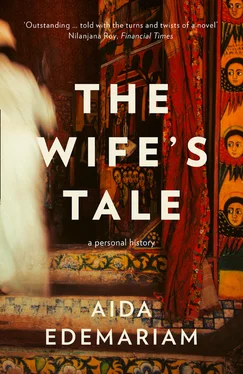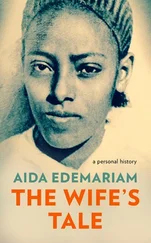Though Ba’ata, just up from the main market, had suffered an inevitable winnowing of its congregation, the itinerant students came still, and Tsega joined them. In the little village in Gojjam where he was born he had gone to church school with all the other wide-eyed boys, learning his alphabet in sing-song call and response. He had learned to write, shaping his letters so they fitted onto the bleached shoulderblades of sheep, because these were plentiful, especially after feast days, and vellum was not; and then he had been taught how to scrape and cure sheepskin to make his own parchment. He enjoyed all this, and found it easy, until one day his father, a priest, came upon him and a young male relative, a chorister, concentrating on a long scroll held down between them: crude archangels, demons, horned women; spells in angular letters, all red. How dare you! His father’s hand had twisted his ear until it burned. How dare you corrupt your learning, your soul, with – this, this dragging of Satan out from where he belongs! I forbid you to pick up a pen and write, ever again. May curses rain down upon you if you even think of tracing anything other than your name!
All the students had to learn most things by heart, but after that Tsega had to commit everything to memory: the divine offices and the book of hours, the antiphonaries, all of David’s psalms. When he graduated to the school of qiné, church poetry, he pulled his head through a rough sheepskin cape, picked up his leather book case, and left for a nearby village, where he had heard a respected teacher was working. A handful of others had done the same, walking in through the valleys and the mountain passes, choosing mastery of poetry in Ge’ez, the church language, over homes that they often never saw again. For five years the sun rose to find them gathered around their teacher, listening to him describe stanza forms, explain particularly pleasing metaphors, recite useful examples. They memorised model qiné and with his help peeled back their punning layers, looking for the gold hidden within the wax mould, the meaning nestling at the centre like the dark hard core of an olive tree. The church told them they were training their minds and souls, opening themselves up to apprehensions of divinity, but Tsega was learning worldlier things too: how to smuggle deniable meanings into seemingly innocuous conversation; how, because qiné carried with it so much prestige, it might be a way for a village boy disinclined to soldiery to chase social advancement.
During the day the students scattered across the countryside, composing their own poetry and begging, as the church provided no food. Tsega hated this aspect of his calling. He was proud, afraid of dogs, and quickly resorted to tall heart-tugging tales. In the late afternoon the students returned to their teacher, who listened to their verses, then easily, deflatingly, disassembled them. Near the end of the five years Memhir Hiruy, famed throughout the country for his skill with qiné, visited the Gojjam school to teach. The students vied amongst each other to impress the master, who after a couple of weeks singled Tsega out for praise. Would he like to come to Gondar to continue his studies? Of course he would. And, ignoring the protestations of his mother, he went.
Not long after they arrived at Ba’ata, the priests asked Memhir Hiruy to perform a qiné. ‘Ask him,’ replied the scholar, pointing to his new acolyte. They were insulted. Recent experience had only confirmed their deep suspicion of outsiders. And who was this anyway? A youth from the sticks – from Gojjam, no less, where everyone knew the evil eye flourished. Why was he here, assessing them with his noncommittal gaze, threatening them with his very presence? Why, he hadn’t even finished his studies. But after a glance at Memhir Hiruy for reassurance, Tsega stepped forward to puncture their scorn.
When Memhir Hiruy left for the new capital, Addis Ababa, Tsega stayed, learning the recondite church dances and committing to memory all the books of the Bible, the Old and New Testaments, their interpretations and commentaries, and the books of the Fit’ha Negest, the law of kings handed down from Byzantium and from medieval Egypt. He became a teacher himself, and, ambitious in the way of people who know they have only themselves to depend upon, quietly but steadily made connections, travelling across the city after church services to read to the families of increasingly important personages; for Tirunesh’s husband, among them, and for her oblivious niece.
Less than a year after his wedding, Tsega deposited his young bride at her grandmother’s house and was on his way south. The mules were watchful on the long trek down into the Lake Tana basin. Their riders, too, looked around, into shaded copses, up at the lips of ravines, and once they had arrived at the Blue Nile gorge and were picking their way down its steep sides, into anything that even suggested it might be a cave. Everyone knew, from childhood stories, from scarred survivors, that this fertile country ran with bandits who regularly stripped mule-trains of their valuables then pushed off in low reed boats, poling them through the mud-coloured lake to islands and promontories, or disappeared into caves. They were all grateful when they scrambled up onto the wide cool highland plateau and then down, through aromatic juniper and newly imported eucalyptus, down into Addis Ababa.
Once there her husband took his time, acclimatising, visiting Memhir Hiruy, attending services, listening to gossip about the empress, and especially about her subtle regent Ras Tafari, who had recently returned from an extended tour of Egypt, Jerusalem, and the European capitals (where, among other things, he had wisely declined to sign a treaty that would have allowed Italy to build roads, rails, and a port into Ethiopia). The regent also managed – daily, it sometimes seemed – to announce the institution of new-fangled things: a modern school, a printing press, a newspaper. Every decision of any importance passed through his hands, which was a useful thing to know, but for the moment was not what most interested the new-minted priest. Tsega presented himself at the head offices of the church, and was given the care of a country parish called Gonderoch Mariam. He travelled the city to read aloud in the households of great men, among them Ras Kassa, the regent’s pious cousin. And he joined the throngs that arrived daily at the palace, looking for an audience with the empress.
Menelik’s daughter Zewditu, crowned after the brief reign and ruthless deposition of Menelik’s grandson Iyasu, was phlegmatic, conservative, uncomfortable in the presence of men and overwhelmingly pious, and had only once bowed to pressure to preside at the courts that operated in her name; she had hated the work, and never returned. She preferred, wrote her chronicler, kindly, to confine herself to ‘spreading spiritual wisdom by fasting, prayer, prostrations, and by almsgiving’. She read the histories of the female saints, ‘and a spiritual envy [to be like them] was stamped on her heart’. Each day she rose early and prayed into the afternoon, eating nothing, outdoing many of her monks and nuns.
Zewditu’s self-denial was matched by generosity – socially required, an expression of pride and status as well as charity, but prodigal nonetheless. Hardly a month went by without a banquet given to soldiers, to clergy, to the nobility or the impoverished laity, and late one November, after Tsega had been in the capital for nearly two years, he was invited to one. The floor of the great hall was laid with hundreds of carpets, some of wool, others of silk. Guests filled the vast space, seated according to their rank: the empress, her regent and senior princes of the blood on a raised platform at one end, surrounded by curtains, then, when they had eaten, the curtains drawn back so they could look down at long low tables filled with lesser notables, ranks of clergy in high white turbans and glowing white shemmas, straight-backed soldiers. Crosses blinked in the lamplight, phalanxes of servants and slaves brought horns of mead and baskets piled high with injera. The smell of dark red chicken stew; of zign, beef in ginger and cardamom and bishop’s weed; the sight of entire sides of fresh-slaughtered oxen carried on poles balanced on the shoulders of slaves so anyone could take a knife and help themselves, made him ravenous, but he ate nothing at all.
Читать дальше












